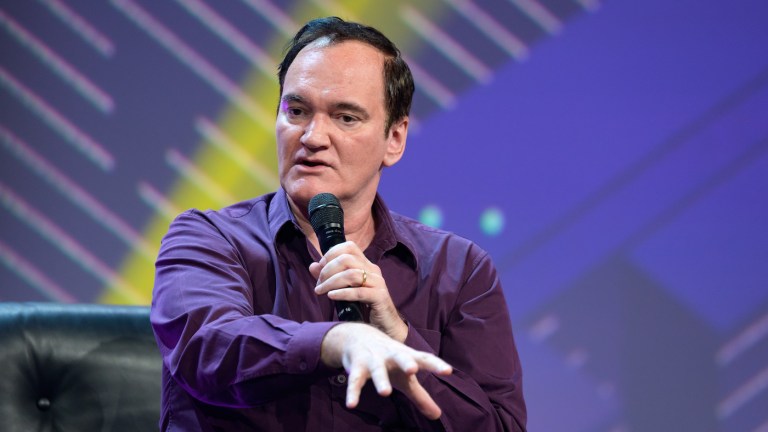Quentin Tarantino Reveals His Big Problem with Marvel
Quentin Tarantino doesn’t hate Marvel Studios movies, but he does have a problem with their effect on the movie industry.

Quentin Tarantino and Marvel Studios have been linked frequently in the press as of late. It was only a handful of weeks ago when the mercurial auteur behind such classics like Pulp Fiction and Kill Billmentioned, almost as an aside, that a lot of filmmakers are waiting for superhero movies to fail; he’s also been recently asked what comic book property he’d theoretically love to direct and make his own (it’s Marvel’s Sgt. Fury and the Howling Commandos, by the by); he’s even been prompted to state what is the worst era for Hollywood movies, and his answer was a toss up between the 1980s, ‘50s, and today. While he didn’t say it at the time, it seemed likely that Marvel Studios movies played a large role in his view of the modern Hollywood landscape. How could it not?
Now Tarantino has put a finer point on his issue with the current age of mega-franchises and intellectual property obsession. Speaking with 2 Bears, 1 Podcast (via Mediaite), Tarantino reminded listeners that he grew up a voracious reader of Marvel comics and if the Marvel Cinematic Universe had existed back in his youth in the ‘80s, he probably would’ve dug those movies a lot more then. But the problem is that studios are putting almost their entire infrastructure and resources around the Marvel machine and its copycats right now, making it near impossible for a young filmmaker to come up like Tarantino did in the ‘90s by making original and distinct films with a new style or voice. Those types of movies are certainly not dominating the zeitgeist.
“Look, I used to collect Marvel comics like crazy when I was a kid,” Tarantino said. “There’s an aspect that if these movies were coming out when I was in my 20s, I would totally be fucking happy and totally love them. I mean, they wouldn’t be the only movies being made. They would be those movies amongst other movies. But, you know, I’m almost 60, so yeah. No, I’m not quite as excited about them.”
He continued, “My only axe to grind against them is they’re the only things that seem to be made. And they’re the only things that seem to generate any kind of excitement amongst a fanbase or even for the studio making them. That’s what they’re excited about. So it’s just the fact that they are the entire representation of this era of movies right now. There’s not really much room for anything else. That’s my problem.”
And honestly, Tarantino is not wrong. Even when Marvel Studios began as an ambitious gamble in the 2000s, and superhero movies were still the rage at Sony and 20th Century Fox, there was remained a variety of other genres being produced by the Hollywood machine. General audiences were still going to movie theaters every week—not just once in a blue moon for “events.” Millions of folks would turn out monthly for a new comedy, a new action movie not simultaneously intended for eight-year-olds, a new chiller. Adult dramas could still do big business as seen with Brokeback Mountain grossing nearly $200 million worldwide, or The Departed inching closer to $300 million. Romantic comedies were a booming industry unto themselves.
What’s striking about the 2010s is most of these “middle-budget” genres didn’t expire because of a handful of notorious flops like the musicals or Westerns in the 1960s… Hollywood just averted resources all in the name of cultivating larger and larger box office cumes from blockbusters, and all with larger emphases on audience-predictability by way of built-in affection for intellectual properties and “shared universes.” The studios have become Marvelized in trying to build their own big events that act as endless advertisements for the next several films in the pipeline.
There are exceptions, of course, including Tarantino’s last picture Once Upon a Time… in Hollywood, which was made for $100 million by Spidey’s Hollywood home at Sony Pictures. And that QT joint grossed $378 million worldwide. However, the film was made because it was a Tarantino movie. The young gun is now one of the old legends (perhaps one of the last?) whom audiences turn up for just based on name recognition. Just imagine any studio investing $100 million in an adult-oriented period piece from a younger filmmaker.
Admittedly, Marvel is not the only harbinger of change in the industry. Tastes shift and how people consume media has certainly changed with the advent of streaming services like Netflix and Disney+. However, rather than try to counteract those trends, studios have opted to lean into them by relying on “eventizing” their releases into mammoth blockbusters—creating the perception that theaters are only for the big spectacle.
It’s perhaps a chicken or the egg question, then, in guessing who influenced whom between studios and audiences. Either way, audiences have been conditioned to only be excited to go to the theater for formulaic crowdpleasers with big special effects. They’ve been incentivized to only be excited for… Marvel movies (or similar content that chases the Marvel formula).
Tarantino also tweaked this irony by arguing that while the stars of Marvel movies become famous celebrities, they are arguably not movie stars in the classic sense.
“Part of the Marvel-ization of Hollywood is… you have all these actors who have become famous playing these characters,” Tarantino said. “But they’re not movie stars, right? Captain America is the star. Or Thor is the star.”
For someone who idolizes the New Hollywood scene of the ‘70s or the indie revolution of the ‘90s, it might even look like the end times.
